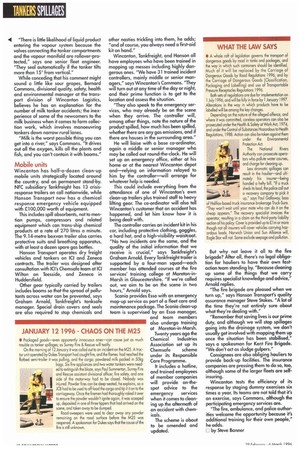WHAT THE LAW SAYS
Page 42

If you've noticed an error in this article please click here to report it so we can fix it.
II A whole raft of legislation governs the transport of dangerous goods by road in tanks and packages, and the way in which such containers should be identified. Much of it will be replaced by the Carriage of Dangerous Goods by Road Regulations 1996, and by the Carriage of Dangerous Goods (Classification., Packaging and Labelling) and use of Transportable Pressure Receptacles Regulations 1996.
Both sets of regulations are due for implementation an 1 July 1996, and will be fully in farce by 1 January 997. Alterations in the way in which products have to be labelled will be among the key changes. Depending on the nature of the alleged offence, and where it was committed, careless operators can also be prosecuted under the Health & Safety at Work Act, 1974, and under the Control of Substances Hazardous to Health Regulations, 1988. Action can also be taken against them under the Environmental Protection Act.
The National Rivers Authority can prosecute operators who pollute water courses, and charge for cleaning up. Less dramatic spillages can result in the haulier—and ultimately his insurer—being handed a hefty bill. 'If a truck sheds its load, the police call out tar, At. a recovery company to pick it up,' says Paul Galloway, boss of Halifax-based truck insurance brokerage Truck-Sure. "They won't wait until your mate who can do it on the cheap appears." The recovery specialist invoices the operator, resulting in a claim on the third-party liability section of his policy. Cover is provided up to El m or more though not all insurers will cover vehicles carrying hazardous loads. Norwich Union and Sun Alliance will, Eagle Star will not. Some exclude seepage and pollution.




































































































